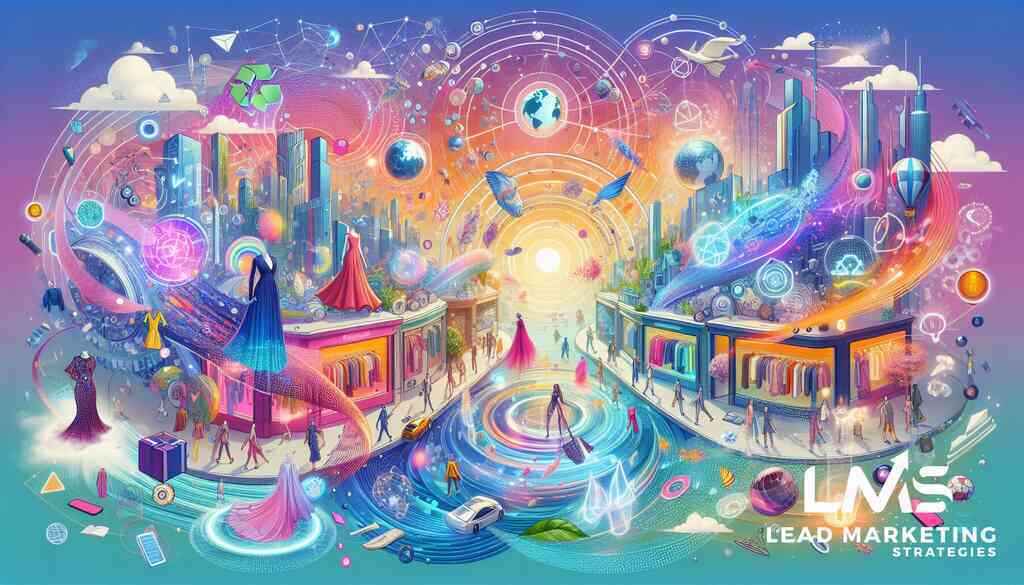Introduction to Fashion Marketing Trends of 2025
Setting the Stage for 2025: A New Era in Fashion
The world of fashion marketing is set for a transformation in 2025, redefining how brands engage with consumers. In this era, digital innovation plays a pivotal role in dictating fashion marketing strategies for 2025, reshaping traditional approaches. The integration of advanced technologies such as AI and virtual reality will create a new realm of possibilities, transforming how we experience fashion. As industry leaders, it’s crucial for Lead Marketing Strategies to guide businesses through this transition, ensuring they are well-prepared to navigate this evolving landscape. This new era promises an immersive experience for consumers, with brands crafting stories that resonate beyond the physical realm.
The Influence of Global and Cultural Shifts on Fashion
Global and cultural shifts will profoundly influence fashion marketing strategies for 2025, turning the industry on its head. With the world becoming more interconnected, cultural diversity will serve as a rich source of inspiration for fashion brands. The impact of these shifts will see brands embracing this diversity, adapting their strategies to reflect a more inclusive world. Inclusive fashion marketing is not just a trend but a necessity for brands aiming to expand their reach. By understanding the intricacies of cultural dynamics, brands can create more personalized experiences, fostering deeper connections with their audiences, as seen in innovative fashion marketing insights presented by industry leaders.
Why 2025 Represents a Turning Point in Fashion Marketing
The year 2025 marks a significant turning point in fashion marketing as brands evolve to meet the demands of an ever-changing consumer base. A notable aspect of this evolution is the shift towards sustainable fashion initiatives, driven by consumers’ increasing awareness and demand for ethical practices. The commitment to sustainability will challenge brands to rethink their marketing strategies, focusing on transparency and accountability. Furthermore, the rise of technology in fashion marketing opens new avenues for creativity and engagement, making it essential for businesses to harness these advancements. By 2025, brands must be agile, innovative, and responsive to stay competitive, as demonstrated by Lead Marketing Strategies’ expertise in embracing change through digital marketing efforts. This pivotal year will redefine how fashion brands connect with consumers, pushing boundaries and setting new standards for the industry.
The Technological Revolution in Fashion
AI in Fashion: Designing Tomorrow’s Wearables
In 2025, artificial intelligence is set to redefine the fashion industry, transforming the way apparel is designed and consumed. AI drives efficiency and innovation, allowing for rapid prototyping and customization of garments to meet individual preferences. Advanced algorithms not only aid in predicting shopper behavior in 2025 fashion but also enhance the creative process by suggesting design improvements. Fashion brands leveraging AI can anticipate trends faster, ensuring products align with consumer desires. The adoption of AI in fashion is not merely about technology; it’s about elevating digital fashion environments to foster deeper connections with consumers.
Augmented and Virtual Realities: The New Norm in Fashion Retail
Augmented reality (AR) and virtual reality (VR) are revolutionizing the retail landscape, offering immersive experiences that bridge the gap between physical and digital shopping. AR applications allow consumers to visualize products in real-world settings, enhancing the decision-making process and boosting confidence in purchases. Meanwhile, VR technologies are establishing virtual storefronts, enabling consumers to explore collections from home, creating a dynamic shopping experience like never before. The integration of augmented reality in shopping not only enhances customer engagement but also positions brands as technology pioneers.
Fashion NFTs and the Rise of Digital Ownership
The fashion industry is embracing NFTs, redefining ownership in a digital world, and opening new revenue streams for brands. Fashion NFTs offer limited edition digital fashion items, creating exclusivity and fostering a sense of community among consumers. This trend not only transforms how fashion is marketed but also how it’s valued, as digital items gain prominence in consumers’ wardrobes. The rise of NFTs signifies a shift towards virtual fashion experiences, enabling brands to connect with tech-savvy audiences and explore innovative branding strategies. Being at the forefront of NFT trends in fashion empowers brands to establish new markets and redefine value propositions.
Integrative Cross-Platform Fashion Marketing Strategies
Cross-platform marketing is crucial for brands aiming to deliver cohesive and engaging consumer experiences across various digital channels. Ensuring seamless integration of messaging and branding strategies across platforms enhances brand recognition and consumer loyalty. By leveraging social media, web, and mobile platforms, fashion marketers can create bespoke campaigns that resonate with diverse audiences. The effectiveness of cross-platform consumer engagement lies in its ability to meet consumers wherever they are, adapting to their needs and preferences. This approach not only amplifies reach but also drives measurable results, crucial for thriving in the competitive 2025 fashion marketplace.

Redefining Consumer Engagement in a Digital Age
Omnichannel Experiences for a Seamless Consumer Journey
In 2025, delivering seamless omnichannel experiences will be paramount as consumers demand consistency across various touchpoints. These experiences ensure that customers can transition smoothly between online and offline platforms, enriched by advanced omnichannel marketing techniques. By integrating physical stores with digital channels, brands offer a cohesive journey that reduces friction and enhances satisfaction. Through the strategic use of data, businesses can anticipate consumer needs, personalizing interactions to reflect an understanding of their preferences. This level of engagement not only increases brand loyalty but also drives conversion rates, as consumers are more likely to purchase from brands that provide tailored experiences.
Influencer Marketing: Evolution and Future
The role of influencers in fashion marketing continues to evolve, with their impact anticipated to grow even more by 2025. Influencers forge authentic connections with audiences, bridging the gap between brands and their target demographics. This shift emphasizes the importance of adapting influencer strategies to remain relevant and achieve measurable impact. The future will see a more sophisticated approach to fashion influencer roles, focusing on micro-influencers who engage niche communities effectively. By collaborating with influencers aligned with brand values and customer interests, companies can amplify their reach and engage consumers more deeply. As influencer marketing matures, success will depend on authentic partnerships and transparent storytelling.
Personalization and Adaptive Fashion for the Modern Consumer
In the era of data-driven insights, personalization in fashion marketing has become increasingly essential. Brands are employing adaptive digital fashion marketing to tailor experiences to individual consumer preferences. This strategy utilizes advanced analytics to understand and anticipate consumer behavior, offering recommendations that align with personal tastes. Adaptive fashion leverages machine learning algorithms to create bespoke offerings, enhancing consumer satisfaction and fostering brand loyalty. The focus on personalization in fashion marketing not only strengthens connections with consumers but also distinguishes brands in a competitive marketplace. By catering to individual needs, fashion marketers can create compelling narratives that resonate personally with their audience.
Interactive Fashion Content: Engaging Through Virtual Storytelling
Virtual storytelling through interactive fashion content is set to redefine consumer-brand interactions. This approach employs innovative technologies to craft engaging narratives that immerse consumers in the brand experience. Interactive content, including videos and virtual try-ons, empowers consumers to explore collections in a captivating manner. By utilizing tools like augmented reality, brands provide immersive experiences that simulate in-person shopping. This method not only enhances engagement but also fosters a deeper emotional connection with the brand. By embracing storytelling, fashion marketers transform consumer interaction into a memorable journey, driving both engagement and conversion in innovative ways, as evidenced by the trends seen in personalized fashion content.
Need Help With Your Marketing?
Our team can help you implement these strategies. Get a free consultation.
Embracing Sustainability and Ethics in Fashion
From Fast to Circular: The Circular Fashion Economy Explained
The fashion industry is undergoing a significant transformation, transitioning from the fast fashion model to a more sustainable and circular economy. This shift is driven by the need to reduce waste and promote environmental stewardship. The circular fashion economy emphasizes recycling, reusing, and redesigning garments to extend their lifecycle. Brands are increasingly adopting circular practices, such as using biodegradable materials and encouraging sustainable consumer behavior. By understanding these dynamics, fashion marketers can develop strategies that align with environmental goals and resonate with eco-conscious consumers. This trend not only supports sustainability but also offers a competitive edge in the expanding market for ethical fashion. By advocating for a circular fashion model, brands not only enhance their reputation but also contribute to a more sustainable future.
Sustainable and Ethical Fashion: Marketing to Conscious Consumers
Marketing sustainable and ethical fashion requires a nuanced approach that addresses the values and concerns of modern consumers. Conscious consumers are seeking transparency regarding sourcing, production processes, and the social impact of their purchases. Brands must be clear about their sustainable fashion initiatives and the ethical standards they uphold. Effective marketing in this sector involves storytelling that highlights the brand’s commitment to fair practices and environmental sustainability. This narrative not only builds trust but fosters a loyal customer base, eager to support brands that prioritize ethical considerations. Engaging with conscious consumers through informative campaigns and authentic storytelling is crucial in establishing long-term brand relationships and driving sales in this growing segment.
Inclusive Fashion Marketing: Broadening Horizons
Inclusive fashion marketing is becoming an essential consideration for brands aiming to capture diverse audiences. The emphasis is on creating fashion products that cater to a broad spectrum of body types, ethnicities, and abilities. Brands that embrace inclusivity not only enhance their customer base but also promote social responsibility. Innovative practices such as customizable products, diverse representation in advertising, and adaptive clothing lines are transforming the industry. By prioritizing inclusive fashion marketing, brands can address the needs of historically underserved populations. This approach not only expands market presence but also cultivates an image of a forward-thinking and socially aware brand. Investing in inclusivity leads to richer consumer experiences and stronger brand loyalty.
Fashion Sustainability Initiatives: Leading by Example
Fashion brands are increasingly taking the lead in sustainability by implementing impactful initiatives that reduce environmental impact. Such initiatives include sustainable sourcing, eco-friendly production methods, and transparent supply chains. Brands leading in these areas often set industry benchmarks, influencing peers and raising consumer expectations. By prioritizing sustainability, companies can differentiate themselves and build a compelling narrative around their commitment to environmental and social responsibility. Successful sustainability campaigns tap into the rising demand for ethical fashion, offering products that appeal to environmentally-conscious consumers. Aligning marketing campaigns with these technologies in fashion marketing initiatives not only strengthens brand credibility but also resonates deeply with the values of today’s consumers, making a lasting impact in the market.

Conclusion: Navigating the Future of Fashion Marketing
Strategies for Staying Ahead in an Ever-Changing Landscape
As the landscape of fashion marketing undergoes rapid transformations, staying ahead requires strategic foresight and adaptability. Businesses must harness the power of data analytics to gain insights into evolving consumer behaviors and preferences. By leveraging AI in digital fashion, brands can anticipate trends and adjust their strategies in real time. It’s essential to integrate seamless cross-channel marketing efforts, ensuring messages resonate at each touchpoint. Collaborating with technology innovators will enable businesses to adopt cutting-edge solutions, thus maintaining their competitive edge. This proactive approach not only ensures relevancy but positions brands as leaders in the digital marketing sphere.
Creating Measurable Results with Innovative Fashion Marketing
Achieving measurable results in fashion marketing demands innovative strategies built on solid foundations. By employing advanced analytics, businesses can tailor personalized experiences that captivate and engage their audience. Emphasizing AI in designing future fashion paves the way for targeted campaigns that resonate with individual consumer needs. Brands must invest in robust digital marketing initiatives, ensuring their presence is consistent across all platforms. The integration of virtual and augmented reality provides consumers with immersive experiences, enhancing engagement and conversion rates. This strategic alignment not only drives measurable outcomes but sets benchmarks for success in the digital age.
The Road Ahead: Preparing for Future Trends in Fashion
Looking towards the future, fashion brands must prepare for an era defined by rapid change and technological innovation. Embracing digital fashion environments will be crucial for engaging the tech-savvy, next-generation consumers. Companies should concentrate on ethical fashion distribution to meet growing demands for sustainability and transparency. By fostering partnerships with emerging tech developers, brands can stay at the forefront of fashion e-commerce evolution. This proactive stance not only expands market reach but also enhances brand credibility and trust. As the future unfolds, companies that anticipate and adapt to forthcoming trends will thrive, leading the way in fashion marketing advancements.
Frequently Asked Questions
Question: How can AI in fashion transform the way brands engage with consumers in 2025?
Answer: Artificial intelligence is rapidly transforming the fashion industry by enabling brands to design, personalize, and market their products more effectively. In 2025, AI in fashion will play a critical role in analyzing fashion consumer behavior, predicting trends, and providing tailored experiences for each individual. Leveraging AI allows for real-time adjustments in marketing strategies, ensuring brands stay relevant and competitive. At Lead Marketing Strategies, our digital marketing services integrate AI to help brands drive engagement, optimize campaigns, and achieve measurable results. By partnering with us, businesses can harness the power of AI to create innovative and efficient digital fashion marketing strategies.
Question: What role does sustainable fashion marketing play in building brand loyalty?
Answer: Sustainable fashion marketing is becoming essential as more consumers prioritize ethical and environmentally-friendly practices. Emphasizing sustainable fashion initiatives allows brands to resonate with eco-conscious consumers and foster brand loyalty. By adopting a circular fashion economy and transparent practices, brands demonstrate commitment to sustainability, which is increasingly valued by customers. Lead Marketing Strategies helps brands communicate their sustainable efforts effectively through personalized fashion marketing and storytelling that aligns with consumer values. As experts in both digital and ethical fashion marketing, we offer tailored campaigns that not only build brand trust but also position businesses as leaders in the sustainable fashion industry.
Question: In the context of What Are the Leading Fashion Marketing Trends in 2025, how significant are virtual and augmented realities for future retail strategies?
Answer: Virtual and augmented realities offer groundbreaking opportunities to redefine fashion retail experiences in 2025. These technologies enable immersive shopping through virtual try-ons and augmented reality visualizations, bridging the gap between physical and digital storefronts. They enrich consumer interactions and enhance the omnichannel experience, simplifying the purchasing process and increasing consumer confidence. At Lead Marketing Strategies, we specialize in integrating these cutting-edge technologies into marketing strategies, allowing brands to create interactive fashion content that captivates and converts. By adopting virtual and augmented realities with our expertise, businesses can stay ahead of the curve in fashion e-commerce trends.
Question: How can fashion brands effectively utilize influencer marketing to reach their target audience in 2025?
Answer: Influencer marketing continues to evolve and remains a powerful tool for connecting with audiences and building authentic brand relationships. By 2025, influencers will play an integral role in fashion marketing strategies, particularly through partnerships with micro-influencers who engage niche communities. Lead Marketing Strategies helps brands craft impactful campaigns by identifying influencers aligned with their brand values, ensuring authenticity and relevance. With our guidance, brands can leverage influencer marketing to enhance brand awareness, reach targeted audiences, and generate engagement across social media platforms, ultimately leading to increased conversions and growth.
Question: Why is it important for fashion brands to adopt cross-platform marketing strategies?
Answer: In today’s digital age, reaching consumers requires a seamless cross-platform marketing strategy. Fashion brands must deliver consistent messages and experiences across various digital channels to improve brand recognition and foster consumer loyalty. Cross-platform consumer engagement allows brands to reach their target audience where they are most active, adapting messaging to suit each platform’s unique strengths. By collaborating with Lead Marketing Strategies, fashion brands can implement effective, cohesive campaigns across social media, web, and mobile platforms. Our expertise ensures an integrated approach that amplifies reach, engages diverse audiences, and drives measurable results in the competitive fashion marketplace.
Let Us Help You Implement These Strategies
Stop struggling alone. Our expert team has helped hundreds of businesses achieve their marketing goals. Get your free consultation today.

